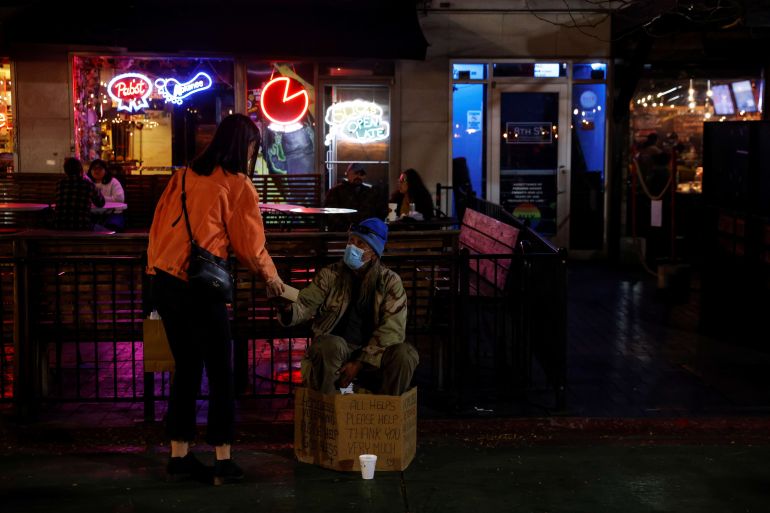Brace yourself for an even more unequal post-pandemic world: WEF
The world, laden with COVID-19 scars, is ill-prepared to take on growing existential threats, a new report warns.

The world is growing more unequal and the divergence, made worse by the pandemic, is sure to cause additional tensions, resentments and further complicate nations’ responses to climate change, economic disparities and social instabilities, according to a new report.
The Global Risks Report 2022 (PDF) – a 17th edition from the World Economic Forum (WEF) and released on Tuesday – warns that the economic recovery from the coronavirus, much of which has relied on the roll-out of vaccinations, has deepened divisions among nations and in the international community at large.
Keep reading
list of 4 itemsInflation is the buzzword at US Fed chief’s confirmation hearing
Latest COVID updates: WHO says repeat boosters not good strategy
‘COVID Zero’ Hong Kong pushes supply chain to breaking point
“The world has been through a lot together, but we are not recovering together: 2022 starts with half of the population still unvaccinated and an uneven economic rebound that could split the global economy,” Emilio Franco, WEF’s head of global risks, told Al Jazeera.
In the poorest 52 countries — home to 20 percent of the world’s people — only 6 percent of the population has been vaccinated (compared to 69.9 percent in high-income nations), according to the WEF report.
“This is why our Global Risks Report warns of global divergence as the main risk; it will create tensions domestically and abroad at a time when societies and countries need to work together to restore confidence and build future resilience,” Franco added.
Moreover, inflation, supply-chain disruptions, soaring debt and protectionism are steering the world economy into choppy waters. These challenges are compounded by the risks posed by climate change, the growing threat of cyberattacks, mass migration, and a race for space exploration.
The outbreak of a new coronavirus variant at the end of 2021 has confirmed what many economists fear: The global economic recovery is on shaky ground and any disruptions could come with long-lasting consequences.
By 2024, developing economies (excluding China) will have fallen 5.5 percent below their pre-pandemic expected gross domestic product (GDP) growth, while advanced economies will have surpassed it by 0.9 percent, according to the WEF.
Restoring trust and fostering cooperation between countries will be essential to addressing challenges and preventing world nations from drifting further apart, the WEF stresses.
Extreme poverty, climate transitions and rapid digitalisation
The WEF report is based on insights gathered from nearly 1,000 experts who were asked to reflect on the global response to the pandemic and ponder how world leaders can address upcoming challenges. Some 84 percent of those asked said they are concerned about where the globe is heading.
The report also draws from the perspectives of more than 12,000 country-level leaders from 124 nations who identified critical risks.
Social cohesion erosion was ranked as the top short-term threat in 31 countries — including Argentina, France, Germany, Mexico and South Africa from the Group of 20 bloc of nations. Some 51 million more people are projected to live in extreme poverty compared to the pre-pandemic trend, according to the WEF.
A disorderly transition to climate-friendly policies will likely drive apart countries and create barriers among them. The shift away from carbon-intensive industries will cause economic volatility and deepen unemployment, the WEF warns in its report.
The growing dependency on digital systems, which has grown immensely during the pandemic, has changed the world forever. And the world is unprepared: In 2020, malware and ransomware attacks increased by 358 percent and 435 percent, respectively.
One thing the pandemic has shown is that no country is immune to economic, environmental and social disturbances. That is why governments must prioritise investing in preparing for the myriad challenges that await them.
This, says the WEF, means addressing large-scale policy challenges, building resilience to future public health and climate shocks, and encouraging greater private-sector participation in finding solutions.